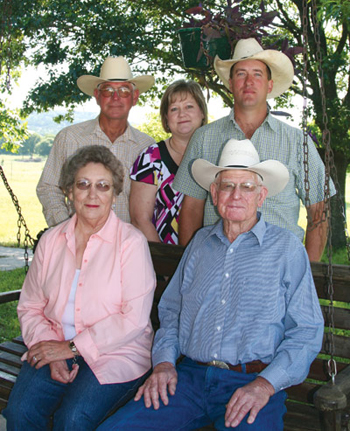
Photos by Janet Hunter
Henrietta and Maurice Young, seated, have farmed and ranched near Jonesboro, Texas, throughout their 60 years of marriage. Standing are son David, left, and David’s son, Kevin, right, who are part of M.E. Young and Sons. Daughter Robin Thomas, center, handles the accounting side of the business.
JUSTIN YOUNG RECALLS THE DAY
four years ago that he suggested to his grandfather, Maurice Young, a lifelong rancher and farmer from Jonesboro, Texas, that the family should get into the poultry business.
“I told Granddaddy we needed to put in some chickens because the cost of fertilizer was going to get us. And then I looked in the paper that day, and Sanderson Farms was looking for growers,” Justin recalls.
For the Youngs, who raise cattle, sheep and goats and farm and ranch in five central Texas counties, the idea of producing broiler chickens was completely foreign. But the family had run the numbers — $50 of litter per acre is equivalent in cost to $300 of commercial fertilizer — and figured that a poultry operation would not only provide additional income, but the litter produced by the chickens would almost erase their fertilizer bill.
It turned out to be a key strategic decision.
With financing from Texas Land Bank, the Youngs — Justin; his dad, Paul; his uncle, David; and David’s son, Kevin — built 12 chicken houses, and in 2007, they started growing nearly 2 million broilers annually under contract with Sanderson Farms.
Today, their commercial fertilizer use is limited to just 60 units of nitrogen per acre, with poultry litter making up the balance. With nearly 8,000 acres of crops to fertilize, the savings are significant.
“Our farming future is based around fertilizer,” says Justin.
While the decision to start an entirely new enterprise might have been daunting for most families, the Young family has always been willing to try new enterprises and do what it takes to be profitable. That and their conservative approach to management are two reasons they run possibly the largest, most diversified, family-owned farming and ranching operation in central Texas, according to their loan officer, Steve Ostrom of Texas Land Bank.
Operating as M.E. Young and Sons, the family farms and ranches on nearly 20,000 acres of owned and rented land in Coryell, Hamilton, Falls, Mills and Robertson counties. They keep 1,900 mother cows, 600 ewes and a small herd of Angora goats — down significantly from the 3,000 goats they kept a few years ago — plus the broiler chickens. Until the late 1980s, they raised hogs, too. This year, their crops include 4,000 acres of corn, 2,000 acres of wheat, 1,200 acres of milo, 800 acres of oats and 300 acres of soybeans, as well as hay.
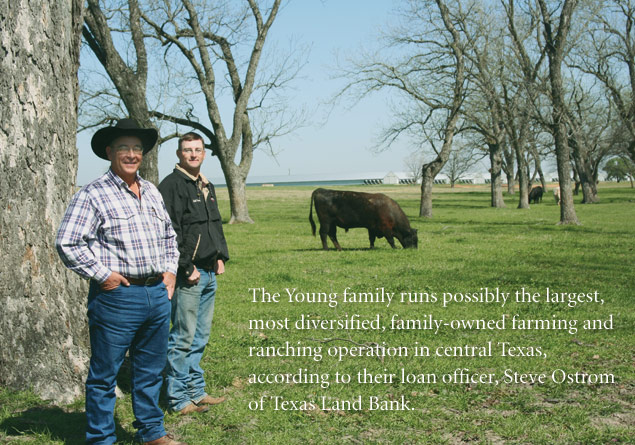
Paul Young, left, and his son, Justin, oversee the family’s operations near Marlin, which include raising broiler chickens, cattle, pecans and field crops.
M.E. Young and Sons was started by Maurice in 1971 to accommodate David and Paul, who had returned to the ranch after attending college. “I told the boys if they’d stay here, we’d make a partnership,” says Maurice, 87, who started farming and ranching on family land east of Jonesboro when he got out of the army in 1945.
Over the years, the family gradually purchased and rented additional land and bought more equipment and livestock. But after Justin and Kevin both completed their studies in diesel mechanics at Texas State Technical College and returned to the business in the late 1990s, even more land was needed to support the growing family.
Paul and David had been looking as far away as Oklahoma and New Mexico for another farm, when one day in 2002, they learned about a place near Marlin, about 50 miles to the east. Located along the Brazos River, the farm featured prime Brazos-bottom red sandy clay soil, 2,000 native pecan trees and irrigation rights — rights later revoked by the Brazos River Authority.
“When the land came up, we had to jump on it,” says Paul. “Texas Land Bank made the deal go through real quick. Steve really pushed it through.”
For the first few years, Justin and his wife lived on the property, raising cattle and growing corn, wheat and other crops. When the Youngs started the poultry operation, Paul and his wife and daughter relocated from Jonesboro to Marlin, as well.
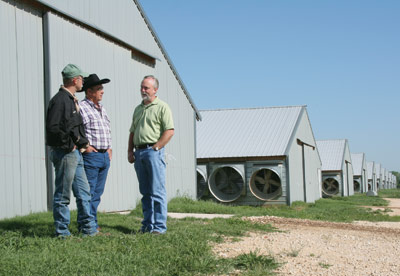
Justin, left, and Paul Young visit with Steve Ostrom of Texas Land Bank in front of their 12 chicken houses. M.E. Young and Sons has been a Texas Land Bank customer since 1982.
But distance from one farm to another has not weakened the partnership. Instead, it has brought diversity and new opportunities to the business. For instance, on the Marlin farm, with its better soil, Paul and Justin planted 20 corn varietal test plots this year. Furthermore, their stocking rate for this property is one cow for every three acres — considerably better than on any of the family’s other properties. Someday, they say, they might even find a way to earn income from the recreational opportunities afforded by their river frontage.
The two brothers and their sons continue to work together, equally sharing ownership of the entire farming and ranching business, spread over nearly 100 miles. Equipment is also shared among the various operations. In spite of the distance between farms and ranches, this arrangement minimizes costs, Kevin explains.
None of the family members has a specialty — except Robin Thomas, David and Paul’s sister, who serves as their accountant, bookkeeper and financial advisor. A certified public accountant, she and her husband, Jody, operate the Coryell County Commission, a livestock auction business in Gatesville.
At least once a month, the partners meet with Robin to review the accounts and discuss plans. When there’s a major decision to be made, all parties have to agree, “or if you keep quiet, you don’t say anything later,” David says.
Robin says she is often asked how the family members manage to run such a large, diverse operation successfully and all get along. “They all have the same work ethic. They have the same goals, and even though they have different ways of working, they all get the job done,” she says.
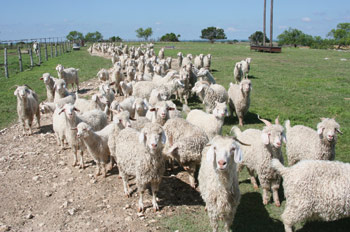
Goats play only a small role in the family business today, but they were once a key source of income.
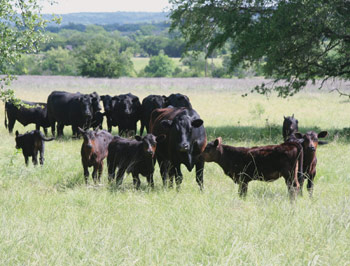
Angus cows and their calves graze on the headquarters ranch near Jonesboro. Beefmaster-Angus crossbred heifers produced here are raised as replacements for the Youngs’ other ranches.
“Nobody has a hobby. They work 24 hours a day, seven days a week. Even today, Daddy doesn’t go to the coffee shop in the morning; he goes to the chicken house or the garden,” Robin comments.
Still, Justin and Kevin both make time to play farm leadership roles, with Justin serving as president of the Falls County Farm Bureau and Kevin serving on the Coryell County board for the Farm Service Agency. And the family members share a sense of humor and accept each other’s foibles, as evidenced by good-natured stories told on one another over lunch.
In her accounting business, Robin says she sees farmers “take leaps they shouldn’t.” The Youngs are conservative in their management style, however, even though they have quadrupled the amount of land they farm and doubled the size of their cow herd in the past decade, according to Robin. “They’ve always been careful not to bite off more than they can chew. They carefully think through every decision,” she says. “If the numbers don’t work, they won’t do it.”
Credit for that conservative approach to business goes to their parents, Maurice and Henrietta, married 60 years.
“We used to never buy anything we didn’t already have the money for,” says Maurice, who still rides his horse. “But you can’t operate that way today.”
Like their parents before them, Maurice and Henrietta have always reinvested their earnings into land purchases. “My granddaddy had 12 children and gave every one of them a farm,” Henrietta says. “We were land rich and cash poor.”
Today, the current generations of Youngs continue to follow this philosophy. The difference, though: By working together, they have accomplished more than they might have on their own.
– Janet Hunter